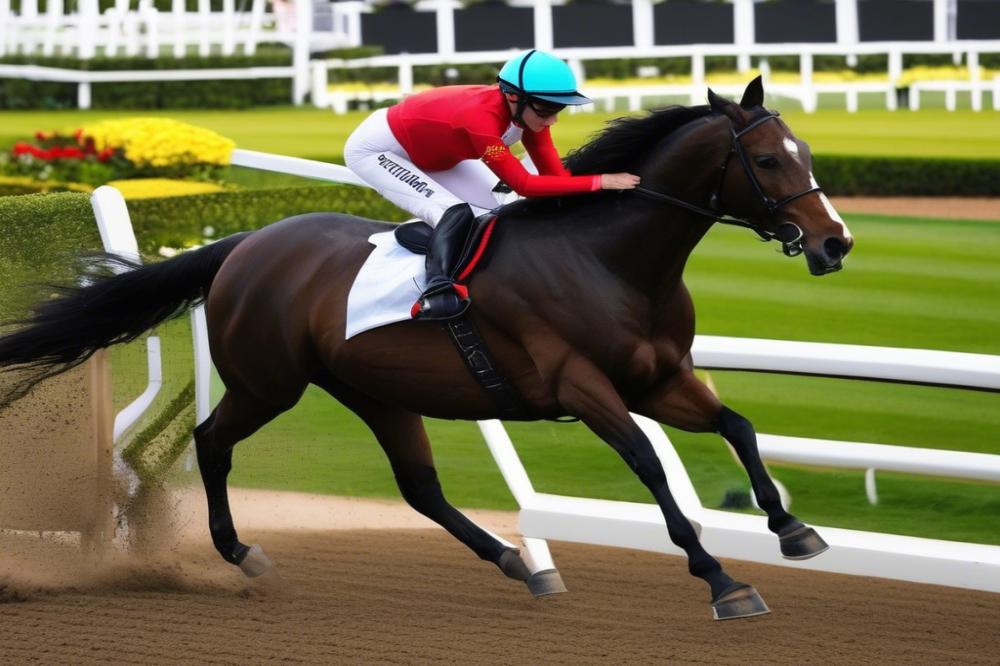Understanding Claiming Races in Horse Racing
Have you ever watched a horse race and wondered what’s going on behind the scenes? In the world of horse racing, there are many fascinating concepts, and one such idea is the claiming race. A claiming race allows any horse in the race to be purchased, or “claimed,” by any licensed owner for a set price. Think of it as a buying opportunity mixed with competition. Just like a yard sale, anyone can swoop in and take home a prized item—except in this case, the item is a beautiful racehorse!
Claiming races play a crucial role in the equestrian sports landscape. They provide a chance for new owners to enter the sport without needing a sky-high budget. This aspect attracts more people to participate in horse racing, contributing to a lively and diverse environment. Not every owner has the means to buy a top-notch thoroughbred straight from a prestigious breeder. Claiming races act like a welcoming gateway for many. Imagine you’re at a fair; everyone has a ticket to ride the roller coaster, not just the elite!
Throughout this article, we will explore key concepts related to claiming races. We’ll touch on the rules that govern them and highlight how they affect the entire horse racing industry. You’ll also get a bit of insight into the respective horse care needed for horses participating in these races. Whether it’s the difference between a Percheron vs Quarter Horse or learning about various British horse breeds, there’s a wealth of information waiting to be uncovered. So, grab a seat, and let’s dive into this exciting topic!
Understanding Claiming Races

Claiming races are a fascinating aspect of horse racing. They offer a chance for owners and trainers to buy horses directly from a race. With these races, anyone with the required funds can enter their horse to compete, which adds an extra layer of excitement. Think of it as a market where horses are the goods being sold!
How Claiming Races Work
In claiming races, each horse has a price tag, known as the “claiming price.” This price is set before the race begins. If a horse wins or places well, another owner can step in to claim it. When someone claims a horse, they pay the listed amount and take over ownership. It’s a bit like a sports trade, but faster and without all the signing contracts.
Types of Claiming Races
There are different kinds of claiming races. Open claiming is one of the most common. In this format, any eligible horse can be claimed regardless of previous performances. However, there’s also starter claiming. This type includes horses that have run in certain races before. That means you often see less seasoned horses for sale, which can be a great opportunity for someone looking to invest in a promising athlete.
Entering Horses and Making Claims
How do horses get entered into these races? Owners usually submit entries to the race track ahead of time. They must meet specific race rules set by the racing commission. Once the race day arrives, owners who want to claim a horse must have their funds ready. They can do this by filling out a claim slip. It’s like ordering takeout, but instead of food, you’re getting a potential champion.
This process can be thrilling. Picture the excitement as the horses line up at the starting gate. Everyone watches closely. If you’re interested in a particular horse, you cross your fingers that someone else won’t snag it first. As the race unfolds, the atmosphere is electric, filled with hopes of claim success.
Claiming Prices and Conditions

In horse racing, a claiming price is like a price tag for horses. This means someone can buy a horse right off the racetrack. Each horse has a specific claiming price set by the race officials. It allows owners to sell their horses, and buyers to acquire them during a race. Generally speaking, the price can vary widely. Some may cost a few thousand dollars, while others may go for tens of thousands.
Several factors come into play when determining these prices. First, a horse’s performance history matters a lot. If a horse has won several races, that price tag can jump. Age plays a role too. Younger horses often have higher prices because they usually have more potential. Trainers and owners also contribute to establishing the price based on their experience and reputation in equestrian sports.
Now, not all claiming races are created equally. There can be specific conditions attached. Some horses might only be up for claiming if they haven’t won a certain number of races. Others may have restrictions based on age or experience. Certain tracks even have rules about the claiming process itself! Each set of race rules is designed to protect both buyers and sellers.
Think about it like used cars. If a car has low mileage and a solid history, it’s naturally worth more. The same logic applies in the horse racing world. Horse care is also essential. Horses that are well cared for and trained can command higher prices. Buyers will likely feel more confident about a horse that looks healthy and well-managed.
In the end, a claiming race isn’t just about the speed. It’s also about smart decisions. Buyers need to understand what they’re getting into. It’s a bit like fishing; you have to know when to cast your line and what bait to use. Choosing the right horse at the right price can be a rewarding experience.
Advantages and Disadvantages of Claiming Races

Benefits for Owners and Trainers
Claiming races provide a real opportunity for owners and trainers. Increased participation is one of the biggest perks. More horses in these events can lead to more excitement and competition. Trainers love the chance to showcase horses that might not have had a shot otherwise. Profits can also come into play. If an owner ends up with a good horse, they could see a nice return on their investment. The thrill of the gamble adds to the fun as well, making it an enticing option for many in horse racing.
Risks Involved in Claiming Horses
Not everything is sunshine and rainbows in this world, though. Dive into claiming horses, and there are risks lurking. Unknown horse histories can send shivers down even the bravest owner’s spine. A horse might look healthy on the outside but could have hidden issues. Losing horses is another hard pill to swallow. When a claiming races happens, there’s always a chance the competitor will snatch up a horse you were keen on. It’s like playing a game of poker, where you can lose more than you bargained for.
Impact on Horse Welfare and Management
Horse care is vital and shouldn’t take a backseat in any discussion about these races. With so many horses changing hands, careful management becomes crucial. Trainers and owners must think about the horse’s well-being during every step of the claiming process. Problems can arise when a horse is claimed by someone who may not provide the best care. The sheer number of transfers can lead to confusion and even neglect in some cases. Equestrian sports should always prioritize the horses at their heart. The decisions made by owners directly affect animal welfare. Therefore, it’s essential to keep the horse’s best interests in mind while navigating the complexities of racing.
Claiming Race Process
Steps Involved in Entering a Horse into a Claiming Race
Entering a horse into a claiming race is not too complicated, but it does involve several steps. First, owners need to check the race conditions. Knowledge of race rules is key here. Next, they must fill out the necessary paperwork. This paperwork typically includes details about the horse’s history and current status. After that, they must decide on a claiming price. This price acts like a ticket to get into the race.
An owner can list their horse for claiming during the entry phase. This is a crucial time where owners must keep everything organized. A little mistake could turn the entry process into a headache. Once the horse is entered, the fun part begins—race day!
The Claiming Process on Race Day
Race day brings excitement. Owners, trainers, and fans bustle around, all eager for the event. Horses are saddled up, and everyone hopes for the best. When it’s time for the race, the action kicks off. Bidders have their eyes on the horses competing. If a horse finishes in the claiming race, bidders who are keen can put in a claim.
Now, each horse that runs in this type of race is “up for grabs” basically, as long as it’s claimed within the set price. It’s like an auction but with horsepower! If someone places a successful claim, they instantly become the new owner of that horse. Meanwhile, the previous owner takes the money. It’s a thrilling process, filled with anticipation, bets, and sometimes even a little drama.
Post-Race Procedures for Claimed Horses
After the race, the claiming process doesn’t just come to a halt. Once a horse gets claimed, specific procedures kick in. The newly claimed horse must be handed over promptly. This transfer includes medical records and care instructions. A good new owner will think about horse care right from the start. They need to keep a watchful eye on their new athlete.
Let’s not forget, the horse must be cooled down and checked after the race. This helps to ensure they’re healthy after the competition. The old owner must also take care of paperwork to finalize the sale. Horse racing is not just about thrills; it’s also about responsibility. With new ownership comes new expectations.
While the excitement of claiming races keeps everyone buzzing, the importance of taking care of these horses should never be overlooked. Each horse has its own story, and every race adds a new chapter to that tale. Just remember, whether you are owning, training, or cheering, it’s all part of the ride!
Comparison with Other Types of Races
Differences Between Claiming Races and Allowance Races
Claiming races and allowance races both attract fans of horse racing, but they serve different purposes. In a claiming race, horses are bought and easily sold during or before the race. Think of it like a big shopping day, where you can just snatch up a horse if you have the money. Allowance races, however, come with specific conditions. These include factors like age or performance history. A trainer might enter a horse only if they meet certain requirements. So, while one race is about a quick exchange, the other leans towards a more careful selection of entrants.
Comparing Claiming Races to Stakes Races
Now, let’s throw stakes races into the mix. Stakes races are the crown jewels of the horse racing world. Horses that run in these events typically have impressive records. Owners and trainers often spend a lot of time and energy preparing for these races. On the flip side, claiming races offer a chance for every kind of horse. Stakes races are all about prestige and big prize money. Claiming races provide opportunities for those not quite in the spotlight. Some may argue that stakes races are where the real stars shine, but claiming races often show the heart of the sport.
Role of Claiming Races in the Broader Racing Landscape
Claiming races play a crucial role in horse racing’s ecosystem. They allow trainers and owners to buy and sell horses easily, which keeps the sport fresh and exciting. This system helps ensure that horses can find new owners when they need a change. Many new owners start here, as claiming races can be more affordable. Plus, these races give horsemen a chance to work with different animals. With changes happening constantly, trainers can put their skills to the test. In the end, claiming races create a unique foundation for talent in equestrian sports. They might not have the glitz of stakes races, but they bring an engaging dynamic to the table.
Case Studies and Notable Examples
Successful Horses That Have Emerged From Claiming Races
Many horses have started their journeys in claiming races. Some of these horses went on to become champions. Think of a horse named Brilliant Speed. Early in his career, he was claimed for a modest amount. Later, he won major races, including the prestigious Travers Stakes. Stories like his show that not all champions begin with a glamorous start.
Another great example is a horse named Cigar. Before becoming a racing legend, he raced in claiming races. Cigar eventually captured the hearts of fans, winning multiple titles. These stories highlight how a horse’s life can change with just the right opportunity.
High-Profile Claiming Race Scenarios and Outcomes
Horse racing is full of surprises, especially when it comes to claiming races. A famous scenario involves a horse named Zenyatta. Though she’s known for elite stakes races, one horse had a similarly shocking rise after being claimed for a mere $40,000. With proper horse care and training, that horse transformed from an unknown to a celebrated competitor on the track.
Sometimes, the claiming process leads to unpredictable outcomes. Imagine the excitement of the crowd as they realize a horse they saw as “ordinary” suddenly wins a big race! These moments create unforgettable memories for fans and jockeys alike.
Impact of Claiming Races on the Careers of Horses and Trainers
Claiming races affect both horses and trainers profoundly. For a trainer, these events can be a chance to show off their talents. Many trainers scout claiming races to find diamonds in the rough. They look for horses with potential that others may have overlooked. A single successful claim can change a trainer’s career overnight.
Horses also gain new chances through this system. Some might find themselves in a stable that treats them with kindness and care. The race rules allow for a fresh start, leading to unexpected success. With skilled care and training, a horse can move from struggling to thriving in a matter of months.
In the world of equestrian sports, stories unfold that pull at heartstrings. Claiming races often showcase determination and the will to succeed. Each race carries stories of hope, dreams, and new beginnings. That’s what keeps the excitement alive in horse racing.
Wrapping Up the World of Claiming Races
Claiming races play a significant role in the horse racing industry. They create opportunities for a wider range of participants, from professional trainers to enthusiastic newcomers. Without these events, many horses might never find a new home, or they might spend their days in less than suitable conditions. Owners who could not afford to buy a high-caliber horse can still enjoy the thrill of racing and possibly unearth a hidden gem.
Looking ahead, it’s clear that the landscape of claiming races is evolving. As new technology and betting practices emerge, we may see changes that can further enhance these races. Whether it’s through improved data analysis for fans or more transparent ownership options, the next few years could bring exciting developments. Perhaps, we might even see a dress code for Haydock races becoming a trend, where both the spectators and participants bring their best game to the track.
The entire concept of claiming races also mirrors the natural world, much like a horse herd hierarchy. Just as herd dynamics influence which horses get the best spots at the hay, claiming races create a system where everyone has a chance to shine—whether the horses are top contenders or those just starting their journey. When you step back and look at the broader picture, it’s evident that claiming races are much more than mere competitions.
In closing, claiming races add a richness to equine sports that benefits everyone involved. They bring a mix of excitement, opportunity, and a sense of community. So, whether you’re a die-hard fan or someone just getting your feet wet in the world of racing, remember that these unique events are where stories are born, and dreams can take flight. Who knows, you might just find the next champion while enjoying the atmosphere of the races!



